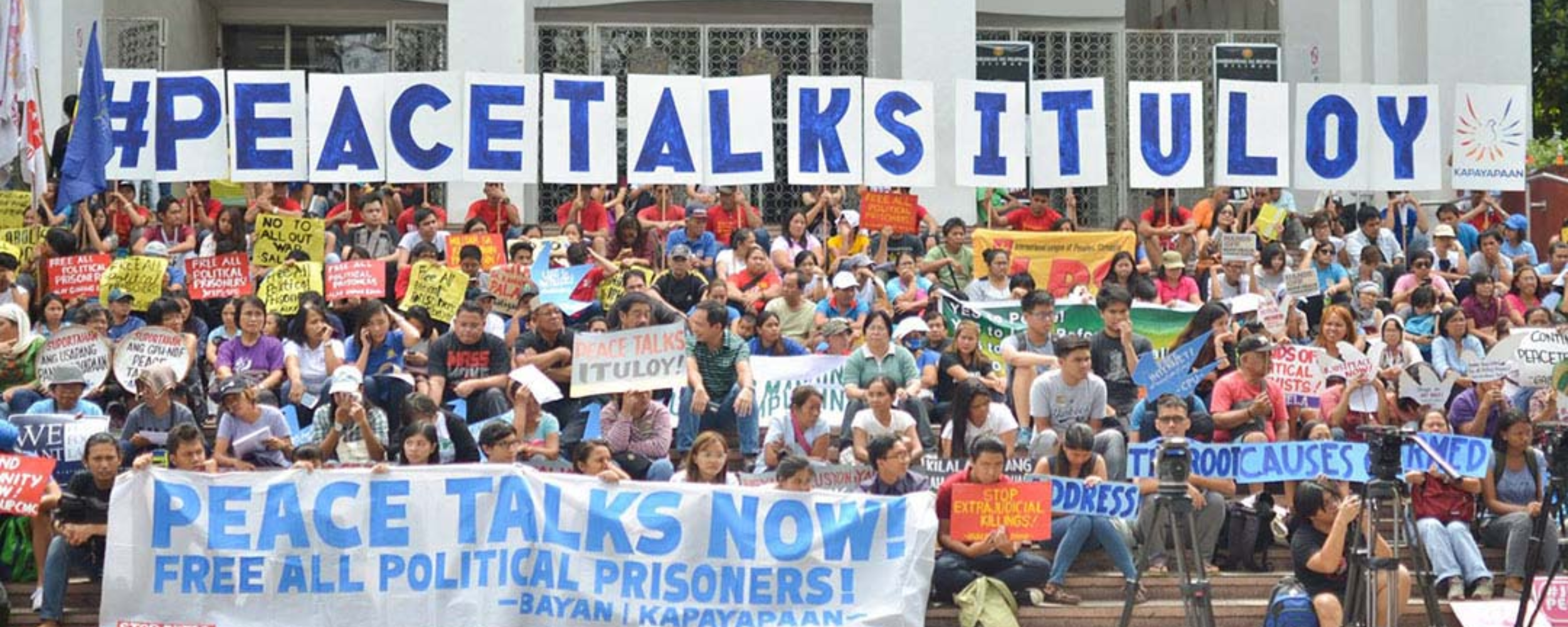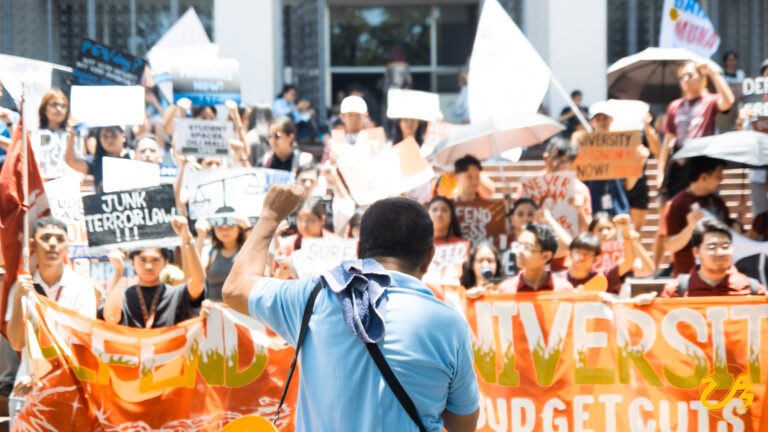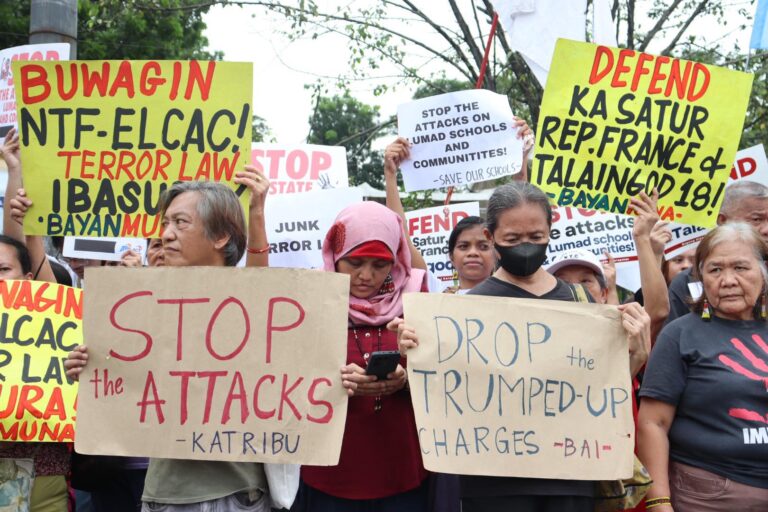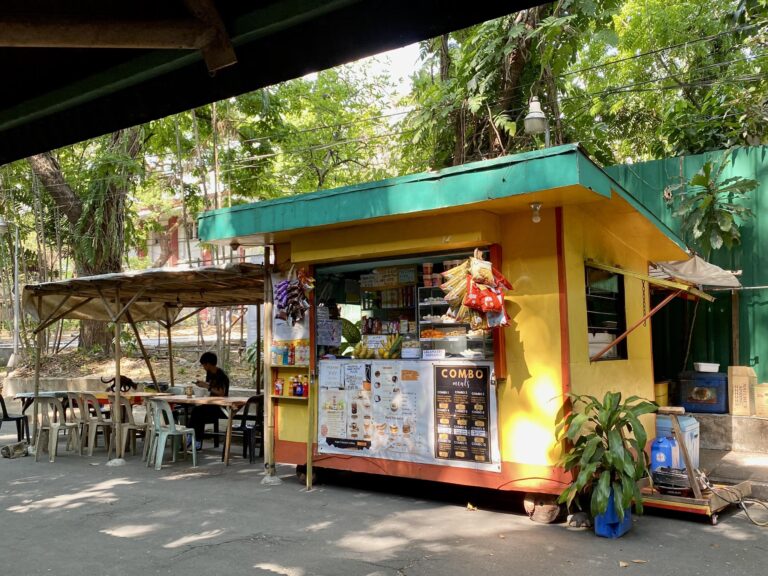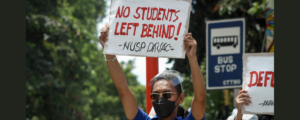
Citing rampant human rights violations against progressives under the previous Duterte and current Marcos-Duterte regimes, various councils clamored for an end to state attacks and renewed peace talks during the second day of the 53rd General Assembly of Student Councils in the University of the Philippines Los Baños.
The resolution was authored by the UPLB College of Agriculture and Food Sciences Student Council, UPLB College of Arts and Sciences Student Council, UPLB College of Development Communication Student Council, UPLB College of Economics and Management Student Council, UP Los Baños College of Forestry and Natural Resources Student Council, and UP Tacloban Student Council
The authored resolution lambasted the Marcoses and Dutertes for resorting to “an unceasing increase in the number of cases of human rights violations and political prisoners” to end the armed conflict instead of addressing the root concerns through genuine peace talks.
No Peace Under Fascist Regimes
The councils cited how under the first Marcos regime and the first Duterte regime, an unprecedented number of mass arrests, disappearances, and killings occurred.
In the two decades that Marcos, Sr. held office, human rights groups recorded 878 disappearances, 70,000 unjust arrests, 34,000 victims of torture, and 3,240 killings by state forces.
The older Duterte’s administration is also smeared with several attacks and executions against the people. His anti-people war on drugs, which he has yet to be held accountable for, resulted in thousands of extrajudicial killings that were “framed in the guise of fake encounters to mask up the ruthless and planned murders of farmers and members of progressive organizations.”
These killings also targeted land and environmental defenders, journalists, political prisoners, and other critics of the regime. The resolution cited Karapatan co-founder Randell Echanis, labor rights leader Dandy Miguel, worker-activist Manny Asuncion, and Lumad teacher Chad Booc as victims of these state-perpetuated murders.
The resolution also condemned the murder of 9 trade unionists and human rights defenders during the Bloody Sunday Massacre on March 21, 2021 in the CALABARZON region.
Following Marcos, Sr.’s footsteps, Duterte also weaponized state forces to crack down on dissent and detain critics of his regime. The last years saw several mass arrests, and even prominent personalities like Senator Leila De Lima and Rappler CEO Maria Ressa were illegally nabbed for speaking out against Duterte.
The Marcos, Jr. administration has only proven to be a duplicate of the previous administration’s strategy to stifle the opposition through state attacks, prevalent even in the early days of his term.
During Marcos, Jr.’s first month in office, 9-year-old Kylene Casao from Brgy. Guinhawa, Taysan, Batangas was killed by the members of the 59th Infantry Brigade-Philippine Army (IBPA) at Sityo Amatong and Sityo Centro. Although they said it was an encounter with the New People’s Army (NPA), residents denied these claims and said that they were threatening residents in the locality.
Days later, members of the 59th IBPA killed 50-year-old Maximo Digno in another so-called “encounter” between the NPA and military forces in Barangay Kahil, Calaca, Batangas. Amid claims of state forces that Digno is part of the NPA, residents state Digno is dealing with a mental health problem. Likewise, residents of the locality once again denied the Military’s claims and said that they were being attacked to displace them from their land.
Marcos, Jr. is nevertheless committed to defending the previous administration from accountability for his human rights violations, saying that his administration has no intention of rejoining the International Criminal Court.
While they say that they want to end the armed struggle, they have refused to enter dialogues. In 2017, Duterte terminated peace talks through Proclamation 360 and tagged the Communist Party of the Philippines-New People’s Army-National Democratic Front (CPP-NPA-NDF) as a terrorist group.
The councils said that their refusal to enter peace talks “manifested the government’s refusal to acknowledge the systemic root causes of armed conflict such as landlessness, oppression, and exploitation.”
Negotiations between the government and the National Democratic started in 1986 after the first Marcos dictatorship was brought down. On September 1, 1992, they signed the Hague Joint Declaration, affirming the need to address the root causes of armed conflict.
The negotiations resulted in several other agreements such as the Joint Agreement on Safety and Immunity Guarantee (JASIG) and the Comprehensive Agreement to Respect Human Rights and International Humanitarian Law (CAHRIHL). These agreements protect peace consultants, condemn unnecessary violence, and bind the parties to International Humanitarian Law.
Although Duterte’s Proclamation 360 ended the talks due to his claims that the CPP-NPA-NDF was insincere, it has been the government that has violated the peace agreements.
Over the years, throughout various post-Marcos presidencies, human rights violations have continued and their perpetrators have still not been brought to justice. Moreover, under Duterte’s regime, several military attacks have violated humanitarian law, such as aerial bombings and strafings, to cite a few.
This has only gotten worse during the Duterte regime, especially because of the National Task Force to End Local Communist Armed Conflict (NTF-ELCAC).
As the resolution stated, the NTF-ELCAC “has been ineffective in solving the long-standing root causes of armed conflict and has only intensified red-tagging, human rights violations, and culture of violence.”
These attacks are only expected to get worse under the Marcos administration.
Calls resume for just and lasting peace
In light of this state-perpetrated violence, the GASC resolved to “consistently call on the Government of the Republic of the Philippines to resume genuine peace talks alongside strengthening awareness and campaigning for justice on human rights violations and political prisoners.” They said that genuine dialogue is a step towards lasting peace.
They also committed to calling out harassment and abuses by state forces, especially against marginalized sectors. They resolved to further amplify campaigns such as “Stop the Killings” and “Stand with our Farmers” to hold the state accountable for abusing the people.
Highlighting political prisoners such as former Senator Leila de Lima, Reina Mae Nasino, the Tacloban 5, and many others, the authors also emphasized the need to condemn attempts to silence critics and call for the release of all prisoners jailed because of their political leanings.
The General Assembly also resolved to:
- call to defund and abolish the NTF-ELCAC and their ingenuine promotion of peace;
- ensure that educational institutions teach students about the root causes of the armed struggle and the continuing need for peace talks;
- support the resumption of peace talks between the Government of the Republic of the Philippines and CPP-NPA-NDF;
- demand accountability from both previous and present administrations for human rights violations; and
- stand firm in the campaign against the fascist Marcos-Duterte regime.
The 53rd GASC has also discussed several resolutions condemning state fascism and the Marcos-Arroyo-Duterte alliance. These resolutions call for condemnation of red-tagging incidents against progressive authors, resistance to attacks on the press, and amplification of calls to defend academic freedom.
#GASC53
Featured image courtesy of Loi Manalansan

